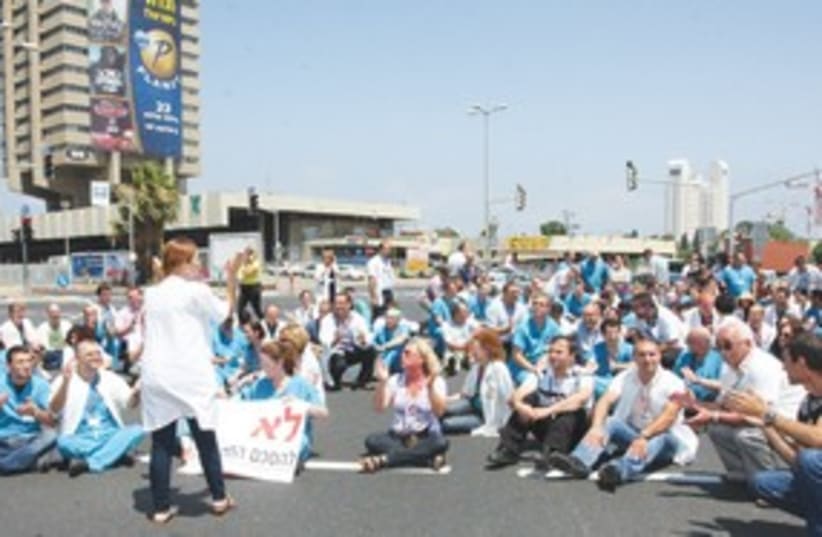RELATED:Labor Court issues injunction against medical residentsPolice block protesting doctors from entering IMA officesDemonstrators said the protest at Ichilov was only the first step, and that they plan on bringing their requests next to the Finance and Health ministries. Some chanted "Knesset, wake up, the health care system is crumbling."According to the medical students, they have joined residents who, late Wednesday night, received an injunction against their protest by the National Labor Court for not coordinating their strike with the Israel Medical Authority.And, what appeared to begin this week as a “rebellion” by “ignored” medical residents and interns, turned on Thursday into a “reconciliation” between them and veteran physicians in the Israel Medical Association as they met at IMA headquarters in Ramat Gan.Instead of calls to abandon the 20,000-member doctors’ association and set up a separate organization for the youngest, hardest-working and poorest-paid sector, the residents and interns said the real struggle was against the government and the Treasury, to get them to spend NIS 5 billion over the next eight years to improve pay, increase manpower in the wards and boost working conditions, and provide incentives for physicians in the periphery and in specialties with too-few doctors.Dr. Yona Weissbuch, a medical resident who graduated from Tel Aviv University’s Sackler Medical Faculty, and is studying at the Rabin Medical Center-Beilinson Campus to specialize in ear-nose-and- throat, told The Jerusalem Post the Treasury tried to “divide and rule” doctors by separating the young from the veteran and besmirching better-paid senior physicians.Weissbuch is chairman of the four-year-old MIRSHAM voluntary organization of some 800 residents and interns, but has a list of around 5,000 doctors and medical students who receive ongoing information. He told the Post they don’t intend to bolt the IMA and set up their own organization to represent them as a union in labor court deliberations or to negotiate a separate agreement.
Medical students join doctors', residents' protest
200 medical students rally outside of Ichilov in Tel Aviv, threaten not to begin residency next year; "We're on [doctors', residents'] side."

RELATED:Labor Court issues injunction against medical residentsPolice block protesting doctors from entering IMA officesDemonstrators said the protest at Ichilov was only the first step, and that they plan on bringing their requests next to the Finance and Health ministries. Some chanted "Knesset, wake up, the health care system is crumbling."According to the medical students, they have joined residents who, late Wednesday night, received an injunction against their protest by the National Labor Court for not coordinating their strike with the Israel Medical Authority.And, what appeared to begin this week as a “rebellion” by “ignored” medical residents and interns, turned on Thursday into a “reconciliation” between them and veteran physicians in the Israel Medical Association as they met at IMA headquarters in Ramat Gan.Instead of calls to abandon the 20,000-member doctors’ association and set up a separate organization for the youngest, hardest-working and poorest-paid sector, the residents and interns said the real struggle was against the government and the Treasury, to get them to spend NIS 5 billion over the next eight years to improve pay, increase manpower in the wards and boost working conditions, and provide incentives for physicians in the periphery and in specialties with too-few doctors.Dr. Yona Weissbuch, a medical resident who graduated from Tel Aviv University’s Sackler Medical Faculty, and is studying at the Rabin Medical Center-Beilinson Campus to specialize in ear-nose-and- throat, told The Jerusalem Post the Treasury tried to “divide and rule” doctors by separating the young from the veteran and besmirching better-paid senior physicians.Weissbuch is chairman of the four-year-old MIRSHAM voluntary organization of some 800 residents and interns, but has a list of around 5,000 doctors and medical students who receive ongoing information. He told the Post they don’t intend to bolt the IMA and set up their own organization to represent them as a union in labor court deliberations or to negotiate a separate agreement.